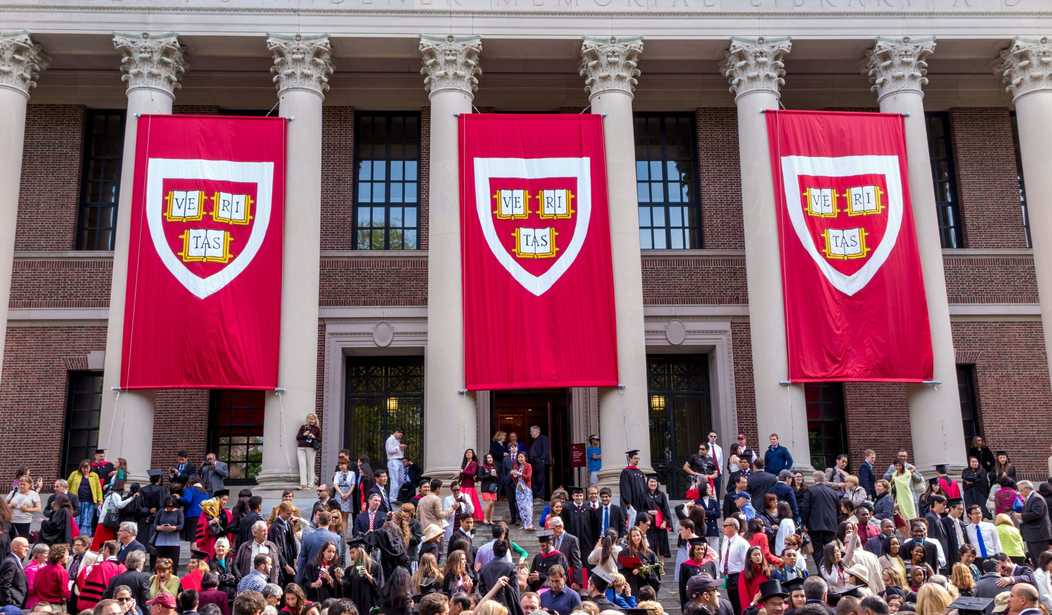On Wednesday, a faculty committee at Harvard University suggested “phasing out” fraternities, sororities, and other social groups on campus, with the goal of “ending the gender segregation and discrimination” of such historic college organizations.
“Harvard students may neither join nor participate in final clubs, fraternities or sororities, or other similar private, exclusionary social organizations that are exclusively or predominantly made up of Harvard students, whether they have any local or national affiliation, during their time in the College,” the proposed rule states.
The rule also emphasizes punishments for students in such organizations. “The College will take disciplinary action against students who are found to be participating in such organizations. Violations will be adjudicated by the Administrative Board.”
While the rule is vague about the type of organizations that would be specifically forbidden for students to join, Harvard spokeswoman Rachael Dane insisted that “appendix 2 in the report (page 17) clearly outlines which organizations they are suggesting.”
That appendix lists social clubs with gender-neutral policies such as the Spee Club, the Oak Club, and the Seneca; female final clubs like the La Vie Club, the Bee Club, and the Pleiades Society; male final clubs like the Delphic Club, the Fox Club, and the Phoenix S.K. Club; fraternities like Alpha Epsilon Pi, Delta Kappa Epsilon, and Sigma Chi; and sororities like Alpha Phi, Delta Gamma, and Kappa Kappa Gamma.
Dane argued that that list is the entirety of the groups considered in the proposed ban, but the language of the rule — “private, exclusionary social organizations that are exclusively or predominantly made up of Harvard students” — suggests a wide berth of organizations, which could broadly be construed to include religious groups, activist groups, and social welfare groups.
The emphasis on preventing discrimination pervades the document. “As long ago as 1988, a faculty member observed that ‘the final clubs are where Harvard students learn to discriminate.’ Such an attitude hardly prepares students for the pluralistic world into which they will graduate,” the committee wrote.
The Harvard faculty committee’s proposal outlines the “explicit goal of ending the gender segregation and discrimination of these organizations in a manner that is consistent with our educational mission, non-discrimination principles, and applicable law.” The proposal also notes that the committee “turned for inspiration to the practices of peer institutions that have taken steps to diminish the role of fraternities and sororities and/or equivalent exclusive-membership private social clubs on their campuses.”
The vague language employed in the second quote might be a hedge, in order to prevent students from forming organizations like fraternities and sororities while using other names to refer to them.
Even so, such a drastic action as forbidding all fraternities and sororities would open the door for the college to prevent other expressions of students’ freedom of association. If avoiding discrimination is the goal, why stop at gender discrimination? Religious and viewpoint discrimination may be fundamental to Buddhist, Muslim, Christian, or political advocacy groups on campus.
Christian groups have already been excluded from some college campuses for requiring leaders to sign a commitment to live a biblical lifestyle and a statement of faith. If Harvard bans fraternities and sororities, what sort of associations will they allow to continue on campus?
Removing fraternities and sororities would be a rather drastic step, even if the policy were to end there. All the same, such a policy would not be without precedent. The committee noted that other colleges have done so, including Amherst, Bowdoin, Middlebury, and Williams.
The proposal suggests phasing out all fraternities, sororities, “and similar organizations” by May 2022, and would first apply to students entering in the fall of 2018. “All currently enrolled students including those who will matriculate this fall will be exempt from the new policy for the entirety of their time at Harvard. This will lead to a transition period, whereby USGSOs [unrecognized single-gender student organizations] would be phased out by May 2022.”
Harvard modeled its new policy very closely on similar policies at Williams College and Bowdoin College.
Contrary to the faculty’s suggestions, discrimination of many forms persists in America’s pluralist society — not all of it pernicious. Fraternities and sororities arguably teach students how to deal with an open society with thousands of exclusive organizations.
It makes a great deal of sense to limit the excesses of these organizations. After all, many fraternities have become notorious for drunken revelries and worse. It is reasonable to limit hazing rituals.
It is arguably unreasonable to entirely eradicate such organizations. Students should have the freedom to associate with whomever they choose, and an attack on fraternities and sororities is unlikely to end there.









Join the conversation as a VIP Member